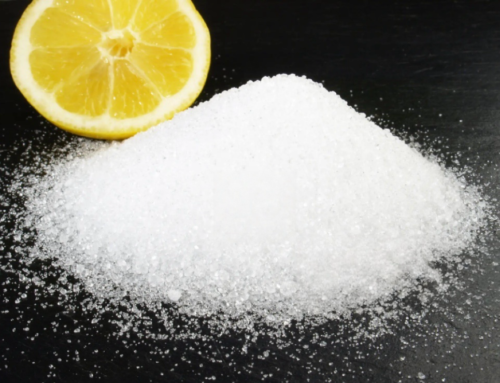 When you take a sip of your favorite sweet and sour beverage, have you ever wondered what makes it taste so delightful? The answer lies in a magical ingredient called trisodium citrate. Trisodium citrate is a versatile food additive that enhances the taste, flavor, and overall appeal of many drinks we enjoy daily. In this blog post, we will explore the fascinating world of trisodium citrate and how it plays a pivotal role in creating those sweet and sour sensations we love.
When you take a sip of your favorite sweet and sour beverage, have you ever wondered what makes it taste so delightful? The answer lies in a magical ingredient called trisodium citrate. Trisodium citrate is a versatile food additive that enhances the taste, flavor, and overall appeal of many drinks we enjoy daily. In this blog post, we will explore the fascinating world of trisodium citrate and how it plays a pivotal role in creating those sweet and sour sensations we love.
What is Trisodium Citrate?
Trisodium citrate, also known as sodium citrate or citric acid trisodium salt, is a white, crystalline powder with a slightly salty taste. Chemically, it is derived from citric acid, a naturally occurring organic acid found in citrus fruits like oranges, lemons, and limes. Trisodium citrate is widely used in the food and beverage industry as an acidity regulator, emulsifier, and flavor enhancer.
Let us have a better understanding of disodium citrate through the following product specifications:
Product Name: Trisodium Citrate
Chemical Formula: Na₃C₆H₅O₇
CAS Number: 68-04-2
EC Number: E331(iii)
Molecular Weight: 258.06 g/mol
Appearance: White crystalline powder
Solubility: Freely soluble in water
Melting Point: 300°C
Why is trisodium citrate used in drinks?
Trisodium citrate is widely used in beverages for its ability to enhance and stabilize flavors, regulate acidity, and improve overall taste.
Acidity Regulation: Trisodium citrate acts as an acidity regulator, helping to control and balance the pH levels in beverages. It neutralizes excess acidity, preventing the drink from being too sour, while still preserving the desired tartness.
Flavor Enhancement: By regulating acidity, trisodium citrate enhances the perception of sweetness in the beverage. This creates a well-rounded flavor profile, making the drink taste more satisfying and enjoyable.
Buffering Effect: Trisodium citrate acts as a buffer, maintaining a stable pH in the beverage. This buffering effect helps preserve the beverage’s taste and prevents undesirable changes in flavor over time.
Emulsification: Trisodium citrate has emulsifying properties, allowing it to disperse and stabilize oil and water-based ingredients in certain beverages, such as fruit juices and smoothies.
The chemical reaction during the use of trisodium citrate involves its interaction with citric acid, which is a weak organic acid commonly found in citrus fruits. Trisodium citrate is a salt of citric acid formed by reacting citric acid with sodium hydroxide. The reaction equation for the formation of trisodium citrate is as follows:
Citric Acid + Sodium Hydroxide → Trisodium Citrate + Water
C6H8O7 + 3NaOH → C6H5O7Na3 + 3H2O
In this reaction, three sodium ions (Na+) replace three hydrogen ions (H+) in citric acid, resulting in the formation of trisodium citrate and water as a byproduct. The trisodium citrate formed is a stable salt that can easily dissolve in water, making it suitable for use in liquid-based beverages.
What are the effects of trisodium citrate?
Lemonade
Lemonade, the quintessential sweet and sour drink, owes its perfect balance of flavors to trisodium citrate. By regulating acidity, trisodium citrate prevents the lemon juice from becoming too sour, allowing the sweetness to shine through.
Soft Drinks
Trisodium citrate is a common ingredient in many soft drinks, especially those with a tangy or citrusy profile. It enhances the effervescence and stabilizes the flavors, ensuring a consistent taste with every sip.
Sports Drinks
Sports drinks are not only refreshing but also essential for rehydration during physical activities. Trisodium citrate helps maintain the desired pH level, ensuring that these drinks provide the perfect combination of sweetness and tanginess.
Iced Tea
Trisodium citrate is often used in iced tea to achieve the right level of acidity and enhance the tea’s flavor, creating a harmonious blend of sweet and sour notes.
Fruit Juices
Fruit juices, especially those from tart fruits like cranberries and cherries, can be quite acidic. Trisodium citrate is added to balance the acidity, resulting in a more pleasant and enjoyable drinking experience.
Mocktails
Trisodium citrate is a favorite among mixologists for creating delightful mocktails. Its ability to balance flavors allows for the creation of complex and refreshing non-alcoholic beverages.
Alcoholic Cocktails
In addition to its role in mocktails, trisodium citrate is also used in alcoholic cocktails to enhance the taste and create a well-rounded flavor profile.
Flavored Water
Trisodium citrate is often found in flavored water, adding a touch of tartness that complements the sweetness of added flavors.
Fruit Smoothies
Trisodium citrate finds its way into fruit smoothies, maintaining the desired acidity level while preserving the natural sweetness of the fruits.
Energy Drinks
Energy drinks are known for their invigorating flavors. Trisodium citrate helps stabilize these flavors, giving a consistent taste experience.
Is Trisodium Citrate Safe?
Yes, trisodium citrate is considered safe for consumption when used in the food and beverage industry within approved limits. It is an FDA-approved food additive and is generally recognized as safe (GRAS) by regulatory authorities, including the U.S. Food and Drug Administration (FDA) and the European Food Safety Authority (EFSA).
Conclusion
Next time you relish the sweet and sour flavors of your favorite drinks, remember the secret ingredient that makes it all possible – trisodium citrate. This remarkable food additive brings harmony to the taste and ensures that every sip is a delightful experience. From lemonade to flavored water and even alcoholic cocktails, trisodium citrate’s magic extends across a wide range of beverages, enriching our everyday drinking moments.
Our company sells high quality Trisodium Citrate. For more information about Trisodium Citrate and procurement consultation, please feel free to contact us at [email protected] or via WhatsApp.Harness the power of Trisodium Citrate to enhance the flavor and quality of beverages.




